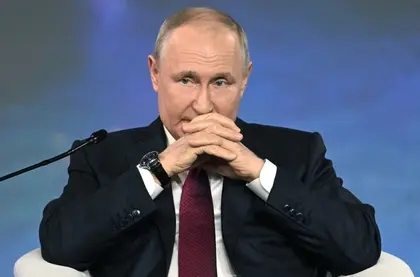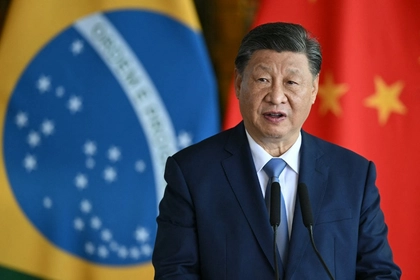The NATO summit in Lithuania has come and gone. Moscow will analyze, conclude and no doubt adopt certain measures in response to certain decisions. There may even be a saber rattle or two.
We’ve heard it many times before. Such rhetoric followed Finland and Sweden’s announcements, more than a year and a half ago, that they wished to join NATO. These two great Scandinavian nations certainly did not want to be left to their own devices next to a neighbor that launched a blistering assault on its other neighbor.
JOIN US ON TELEGRAM
Follow our coverage of the war on the @Kyivpost_official.
Since the Kremlin rolled its tanks and planes deep into Ukraine in February 2022, it has been constantly surprised by NATO – most notably that it did not fall apart. Russia had banked on being able to bring about NATO’s implosion for years, having bribed, spread misinformation, and created an atmosphere of collapse among Euro-Atlantic partners. In fact, the complete opposite has happened.
Moscow was furious when Finland’s path to NATO membership became certain, having hitherto threatened a careful evaluation and strong response if ever that were to happen. The deadlock over Sweden’s membership was met with delight among Kremlin officials, who in turn viewed Hungary and Turkey as true friends for blocking the country’s accession to the Alliance.
But, in recent days, the surprises have just kept on coming.
Firstly, Turkish President Recep Tayyip Erdoğan took care of the biggest when he raised the ramp for Sweden's entry. Hungary will follow that move with inertia. Secondly, Russia was surprised that President Volodymyr Zelensky turned up in Lithuania for the NATO summit, with Kremlin leaders having expected his boycott due to anger at the lack of a tangible membership proposal for Ukraine. Added to that, there’s the fact the door remains open for training Ukrainian pilots on F-16s, which will inevitably lead to the delivery of fighter jets to Kyiv, as well as the US announcing, after a long hesitation, that it has approved the supply of long-range missiles to Ukraine.

From Syria to Africa? Russian Cargo Ship Sets Sail From Syria’s Tartus Base
For each of these shocks, the Kremlin has responded from its playbook of ready threats, saying it will “respond decisively” and “carefully monitor” developments. Indeed, there has been a steady stream of empty threats of counter strikes in response to virtually everything that has been happening to supposedly threaten Moscow’s interests in the past 500 days of war.
None of Moscow’s assertions have come close. None of those “powerful” Russian intelligence services and state institutes for planning and strategic research helped their employer in the Kremlin to accurately predict the moves of the “enemy.”
There has been one surprise after another before the eyes of Russian President Vladimir Putin and his court. Europe has been changing, but not in the way Moscow expected.
Someone has either failed or has not been up to the job. Alternatively – as is often the case in dictatorships – no-one wants to be the bearer of bad news. But that hasn’t stopped the bad news from coming.
Russia lied when it cited Ukraine's intention to join NATO, and the Alliance's readiness to receive it, as the reason for its full-scale attack on Ukraine. The real reason for the invasion was always the Kremlin's desire to conquer, occupy and subjugate Ukraine, impose a puppet regime, and subsequently annex the country.
But the false narrative and deception about preventing the expansion of NATO further eastward and into Ukraine was a command carried out by everyone, from generals to politicians and TV propagandists. They remain convinced of that even today – so much so that a guest on Russian state TV suggested bombing Vilnius when NATO leaders were gathered there.
The reality is that Ukraine was never close to NATO membership before Putin gave the order to invade. Ukraine and Georgia received a careless promise from the US 15 years ago, but nothing ever came of it.
Ironically for Russia, it is now the Kremlin’s state-sponsored aggression that is driving and accelerating NATO membership and, in the end, Moscow's false narrative will unravel.
Moscow’s demand that NATO stop expanding to the east and return to its 1997 borders has in fact promulgated the Alliance’s expansion to the north of Europe, in Russia’s closest neighborhood, where Moscow least expected it.
With the entry of Finland and the imminent accession of Sweden, the Baltic Sea becomes a NATO lake with all its shores belonging to members of the Alliance. The Russian enclave of Kaliningrad thereby loses all meaning and significance for Russia.
Ukraine did not join NATO. Not even this week when it had the most fans. But Finland and Sweden, superpowers of democracy and diplomacy with the world's most modern armies, did. As far as Ukraine is concerned, while its defense is ongoing, it will not become a member of the Alliance, but will, during this time, grow into the best-trained and equipped European military force. US President Joe Biden said he would like Ukraine to join NATO “an hour and 20 minutes after the war.”
Russia’s collapse in strategic planning and assessment has been just one of many of Putin’s failures in the last 18 months, twinned with a defeat of his army at the front and political suicide on the international stage where he has been excluded from all forums with any tangible influence on world affairs. His economy, which has long been unable to finance the war it entered into (again, a bad assessment), has also collapsed.
Putin and Russia are victims of the fake news they have been spreading for decades, both about themselves and others. Their worst nightmare, which they thought was a cleverly devised lie to scare the West as well as their own population, has come home to roost.
Putin saw himself as the master of deception, with his plan to bring the West to its knees and propel Russia to triumph thanks to its mythical powers and historical mission. But when you’re this deep into a fairy tale, it can be very hard to wake up.
The views expressed are the author’s and not necessarily of Kyiv Post.
You can also highlight the text and press Ctrl + Enter










